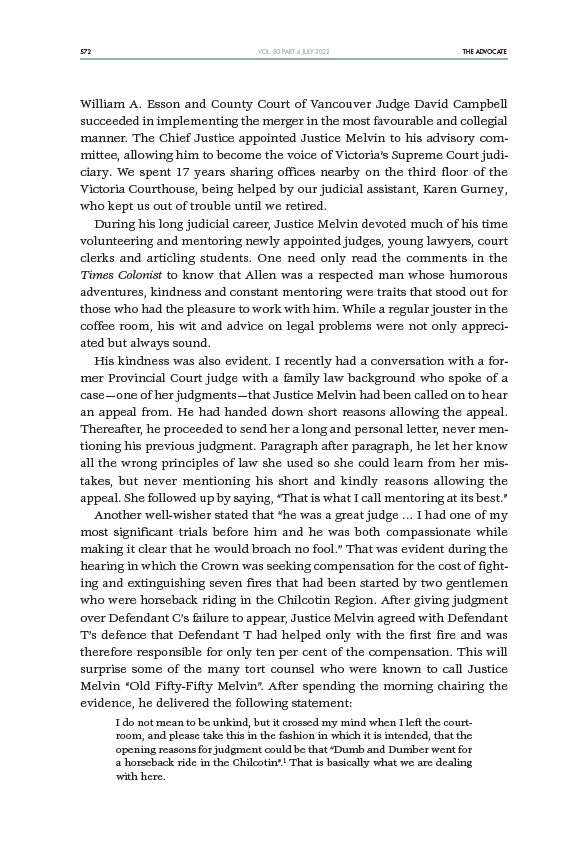
572 THE ADVOCATE
VOL. 80 PART 4 JULY 2022
William A. Esson and County Court of Vancouver Judge David Campbell
succeeded in implementing the merger in the most favourable and collegial
manner. The Chief Justice appointed Justice Melvin to his advisory committee,
allowing him to become the voice of Victoria’s Supreme Court judiciary.
We spent 17 years sharing offices nearby on the third floor of the
Victoria Courthouse, being helped by our judicial assistant, Karen Gurney,
who kept us out of trouble until we retired.
During his long judicial career, Justice Melvin devoted much of his time
volunteering and mentoring newly appointed judges, young lawyers, court
clerks and articling students. One need only read the comments in the
Times Colonist to know that Allen was a respected man whose humorous
adventures, kindness and constant mentoring were traits that stood out for
those who had the pleasure to work with him. While a regular jouster in the
coffee room, his wit and advice on legal problems were not only appreciated
but always sound.
His kindness was also evident. I recently had a conversation with a former
Provincial Court judge with a family law background who spoke of a
case—one of her judgments—that Justice Melvin had been called on to hear
an appeal from. He had handed down short reasons allowing the appeal.
Thereafter, he proceeded to send her a long and personal letter, never mentioning
his previous judgment. Paragraph after paragraph, he let her know
all the wrong principles of law she used so she could learn from her mistakes,
but never mentioning his short and kindly reasons allowing the
appeal. She followed up by saying, “That is what I call mentoring at its best.”
Another well-wisher stated that “he was a great judge … I had one of my
most significant trials before him and he was both compassionate while
making it clear that he would broach no fool.” That was evident during the
hearing in which the Crown was seeking compensation for the cost of fighting
and extinguishing seven fires that had been started by two gentlemen
who were horseback riding in the Chilcotin Region. After giving judgment
over Defendant C’s failure to appear, Justice Melvin agreed with Defendant
T’s defence that Defendant T had helped only with the first fire and was
therefore responsible for only ten per cent of the compensation. This will
surprise some of the many tort counsel who were known to call Justice
Melvin “Old Fifty-Fifty Melvin”. After spending the morning chairing the
evidence, he delivered the following statement:
I do not mean to be unkind, but it crossed my mind when I left the courtroom,
and please take this in the fashion in which it is intended, that the
opening reasons for judgment could be that “Dumb and Dumber went for
a horseback ride in the Chilcotin”.1 That is basically what we are dealing
with here.